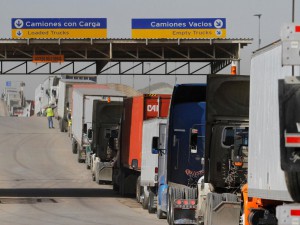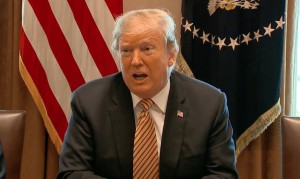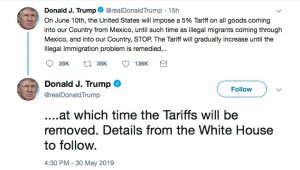
The looming tariffs on products from Mexico ordered by President Trump has auto executives concerned.
With less than a week left before President Donald Trump’s proposed new tariffs on Mexican imports go into effect, auto industry officials are worrying about the potential impact on prices, sales, production and jobs, with at least one industry veteran warning such a move could “backfire” and worsen the current market downturn.
The proposed 5% tariffs, which would cover everything from agricultural products consumer electronics – as well as around $100 billion in cars and car parts – will go into effect on June 10, and then steadily escalate before reaching 25% by October. But there is growing opposition coming from Republican leaders in Congress, Senate Majority Leader Mitch McConnell this week said, “There is not much support in my conference for tariffs, that’s for sure.”
About 2.6 million Mexican-made vehicles worth around $93 billion were shipped to the U.S. last year, with nearly $10 billion in car parts also crossing the border. Since some of those parts show up in almost all vehicles assembled in the States, the tariffs would have an impact on virtually every American car buyer. But the potential is there for U.S. auto workers to also feel the brunt.
U.S. car sales have fallen by nearly 3% for the first five months of 2019, and automakers have already begun trimming back production, especially at plants producing slower-selling passenger car models. General Motors announced around 14,000 job cuts last November, with two U.S. assembly plants closing. Ford is trimming 7,000 jobs, with no plant closures, it said last month.
(Auto stocks take a beating as industry prepares for Mexican tariffs. Click Here for the story.)
The situation could get significantly worse, however, according to a number of industry insiders and analysts. The planned tariffs set to go into effect next week could force prices on a vehicle like the Chevrolet Silverado or Ram 1500 to jump $1,500 or more, a figure climbing to $7,500 by October. For a luxurious Audi Q5 built near Puebla, that could top $10,000 before the end of the year. And even American-made vehicles using parts like Mexican wiring harnesses could see price hikes of hundreds, and even thousands, of dollars.
That’s a serious problem at a time when industry data shows new car prices averaged about $34,000 in May, according to Carla Bailo, president and CEO of the Center for Automotive Research.
“You’re seeing a lot of companies curbing spending” as they begin to cope with the sales downturn and worry about what Trump’s broader trade strategy might mean, said Bailo. The danger for the administration, she added, is that this could “backfire” and actually cost American manufacturing jobs if higher prices sent sales into a tailspin.
That was echoed by a statement from the Volkswagen Group just before the president last month announced he would delay by up to six months a decision on a Commerce Dept. report that declared foreign-made automobiles a threat to national security. The president now has another six months to decide whether to implement tariffs of up to 25% on vehicles from sources like Germany, Britain, Italy and Japan.
(Click Here for more on the impact of the Mexican tariffs.)

President Donald Trump surprised Mexico by slapping a new tariff on the country in an attempt to stem illegal immigration.
“We believe that tariffs of this kind are a tax on the U.S. consumer and will result in higher prices and also threaten job growth,” VW said. The company had planned to expand its big assembly plant in Tennessee by adding the production of two new battery-electric vehicles there. But they would rely on parts from Europe, among other places and, the company added, its plans “would be impaired by restrictive changes to trade.”
The auto industry is at ground zero in Trump’s trade battles. Ford and General Motors each said they spent about $1 billion more than expected on imported aluminum and steel last year. Automakers responded positively when, on May 17, the White House rolled back that tariff on metals from Canada and Mexico.
“We are pleased that the U.S., Canada and Mexico have reached an agreement that will help us as a region,” Joe Hinrichs, Ford’s president of automotive operations, told TheDetroitBureau.com.
But the threatened tariffs on Mexico could create major new headaches, disrupting what Steve Kiefer, global purchasing chief at General Motors, called “a well-tuned supply base” built up over the past three decades under NAFTA. “That would have to change on short order,” said Kiefer, though, in reality, it would be difficult to shake that network up anytime soon.
(Trump’s “national security” tariffs could be blocked by WTO. Click Here for more.)
For now, GM is asking its suppliers “not to do anything and be calm,” Kiefer saying he is hoping for “a resolution” before the tariffs take effect.

